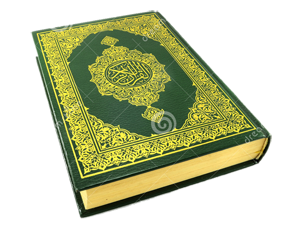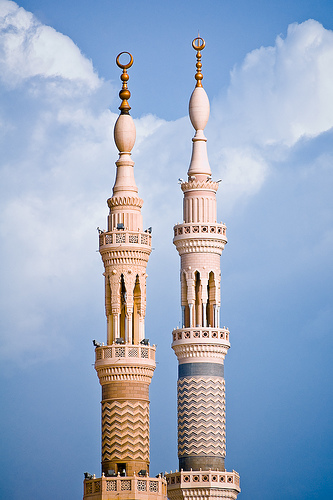The Pursuit of Knowledge and the Pursuit of Piety
The Pursuit of Knowledge and the Pursuit of Piety
by Ruby Amatulla
With the very first revelation in the Quran, God is commanding humankind to read:
“ Read in the name of your Sustainer, who has created – created man out of a germ-cell! Read – for your Sustainer is the Most Bountiful One Who has taught the use of the pen – taught man what he did not know!” [ 96: 1-5 ]
What is this ‘reading’, and ‘use of the pen’ God is implying? This cannot be simple reading and writing in the ordinary sense. Because if this Message is for humankind as declared in many places, most of humankind at that time and still now, did not know how to read or write. It must be much broader in scope and deeper in meaning: On the grand scale of human knowledge and understanding, the ‘reading’ implied here may be the ‘reading’ of the reality: deciphering God’s truth (huqq) inscribed in the reality through the signs (ayats) He has deliberately put it for a human to note, ponder and figure: This ability to note a sign and where it points to is wisdom. That is why in all religions, wisdom and righteousness are synonymous. Wisdom penetrates the veil of illusions and appearances of reality to find truth in life, in nature, and in the seen and the unseen Universe.
And the ’the use of the pen’ may mean retrieving, preserving and spreading knowledge in all its forms and dimensions.
How important is the pursuit of knowledge in Islam? The Quran in many places in many ways implying that there is actually no difference between righteousness and wisdom [hekmah]: these are synonymous. A truly wise person cannot fail to be righteous and a truly righteous one is wise. One’s faith and piety is as good as one understands it to be.
Knowledge and wisdom delivers the understanding of God’s moral law and the true pattern of causes and consequences that help shape one’s conviction. And piety and actions emanate from conviction: higher the wisdom and understanding deeper the conviction. On the other hand piety helps increase one’s wisdom that act on acquired knowledge and information to transform to higher level of awareness and appreciation. These two factors are deeply interdependent and mutually reinforcing.
For example: in the Quran, the sky is compared with a “canopy”, the function of which is to protect and to provide shelter. To an uninformed person the sky appears like a canopy and he/she appreciates it that way. But to an informed person, that canopy consists of the ozone layer and the magnetic field to save life from harmful rays and discharged particles from the Sun. The level of understanding and appreciation of God’s Mercy among these two groups cannot be same. Knowledge and piety help one to achieve higher levels of spiritual existence through higher understanding and appreciation.
There are two kinds of knowledge : the one is the inherent knowledge that is wisdom -- the capacity or ability to know and distinguish right from wrong and to see God’s truth -- implanted in nature [‘fitra’] at the time the Creator created humans (Quran 30: 30). Each one of us possesses this inherent capacity: it is like the unseen umbilical cord between a human and the Creator. The purer it remains in its nature, the higher is its capacity to receive God’s guidance to see His signs [ayats] in reality and understand things better. This capacity is inherent but latent in every human being until he/she acts on the acquired knowledge. If one attempts to be sincere and righteous this latent capacity becomes more and more manifested as he/she acquires information. Therefore it is the paramount duty of a Muslim -- all throughout his/her life -- to practice piety and to acquire knowledge both. Both of these drives would lead to closer and closer to God.
One’s piety sharpens the capacity to understand while knowledge enlarges this capacity. Righteousness can emanate only from the right understanding of God’s Will and His moral Law and the active submission to this Law. That is the essence of Islam. Without the right understanding righteousness is not possible. However the pursuit of right understanding requires both practice of piety and search of knowledge and this intertwined process leads to the core of Islam.
Wisdom is the frame of mind in which the information is sorted, placed, looked at, and understood. Information is like a tree, but not the forest, merely dots in a pattern but not the whole pattern. Wisdom, however, is the ability to see the forest, to know the pattern, and to comprehend the truth. Wisdom leads one to pursue the right goal, to set the right priorities, and to do the right things in life to be truly successful. Righteousness essentially is the result of wisdom. Therefore the objective of knowledge is to achieve wisdom. The Quran exhorts the believers to pray for knowledge because ultimately true wisdom and understanding come through God’s guidance. One could avail this Guidance only when one pursues to be pious and pursues to be knowledgeable.
In the Quran [4: 162], God says “..those from among them who are deeply rooted in knowledge, and the believers who believe …….these it is unto whom We shall grant a mighty reward.” The Quran then exhorts the believers to ask knowledge from God.
The purpose of the Quran, as the Book proclaims, is to Guide, to warn and to give glad-tiding to humankind. If one does not know or understand the Message of the Quran how then this Book could help fulfill these purposes?
To understand the Quran one needs to remain conscious of one’s allegiance to God. That is the highest allegiance that supersedes all other consideration or loyalty or commitment in life: such as the loyalty to a leader, an Imam, a scholar, a group, a sect, a tribe or even family members. There is no blind following in Islam. One is responsible for one’s conscience – the capacity to discern right from wrong – that God has empowered a human being with.
Therefore one must remain committed to the pursuit of knowledge and understanding to his/her utmost sincerity and openness in order to receive God’s guidance to wisdom. Any blind following may lead to wrong ideas and wrong things. The Quran warns that – on the Day of Judgment – followers will not be able to absolve their respective responsibilities by finger-pointing at the leaders who mislead them. Each human being remains responsible for his/her understanding and action because God has given him/her the inherent ability to know, understand and do the right thing if one chooses to do so.
The way knowledge can be pursued is by using the faculty of ‘reason’ [‘aql’] on the acquired information. The faculty of reason is the vehicle through which wisdom can be achieved: The Quran lays down the things that can corrupt this faculty of ‘reason’: arrogance, ignorance, and addiction to the illusions of life. If the true ‘nature’ can be kept purer by complying with God’s Laws, then ‘reason’ transforms the acquired information into wisdom.
This enormous endowment of ‘reason’ is the reason why one remains accountable to the Creator for one’s attitudes and actions. This is an enormous gift and an enormous responsibility. For this ability a human is given ‘the burden of choice’ and a god-like status: God commanded the angels to bow before a human because of this faculty of ‘reason and knowledge’: “And He imparted unto Adam the names of all things [ ism ]” (2: 31)
What are these ‘names [ “ism” ]’? The Arabic word “ism” used here also implies “the knowledge [of a thing]”. That is to know and to identify the elements and components of the reality. One has to apply ‘reason’ on the ‘acquired information’ to know these components: the forces and matter and their nature and interaction patterns, and the nature and the interaction patterns of living things, etc.
Responsibility always equates ability and empowerment: God knows the ability of this endowment He has granted to humans. So God has placed the highest responsibility of representing Himself on human beings. How? What is this responsibility? The answer clearly is to take care of God’s creation similar to the way He Does: with truth and justice, with care and compassion, with restraint and balance, and with patience and wisdom.
This life, therefore, essentially is a test of ‘reason’: choices made on the basis of sound reasoning of considering the whole reality and purpose or on the basis of flawed reasoning obstinately ignoring the truth. The Quran refutes the assertions of the European ‘enlightenment’ period that ‘faith’ is not based on reason, and that faith exists when reason fails. In Islam faith cannot be achieved without ‘reason’, and this process of reason is to attempt to see the bigger picture: the entire panorama of existence and its purpose.
God has provided us with this reality with full of signs for us to deduce truth. And He has endowed us with the ability of reason to reflect upon this bewildering creation. At every level of knowledge and understanding one can see the profound signs of His Presence all around: in the process of procreation and propagation of life and vegetation and in the process of balance and harmony in the nature, the messages are there for one to see the Truth. Everything in it is pointing toward the Existence of a Supreme Planner, Creator and Sustainer.
It is not a coincidence that we constantly and consistently find corollaries or parallel ideas between the physical laws and the spiritual laws, the physical phenomena and the behavioral phenomena, the nature of matter and the nature of mind: as if the seen phenomena is reflecting the deep unseen phenomena through a veil of parallel images.
The most complex and incomprehensible ideas can be presented and intuitively understood through parallels of expressions. That is why the Quran uses allegories and parables to present deep seated truth for human perceptions.
The Quran is full of exhortations such as: “so that you may think”, “so that you may know”, “so that you may become wise”, etc. These are appeal to that faculty of ‘reason’ the Creator has gifted us with in our ‘true nature’. Following that ‘true nature’ is the true religion [Quran 30:30].
Understanding the spirit of the Quran and the Prophet the sincere followers embarked on a journey to search truth by acquiring information and applying ‘reason’. This pursuit with an open mind helped landed them on the Golden age of Islam. Threatened by the openness, free thinking and analytical reasoning [ijtihad] the then orthodoxy along with the power of the state sealed the door of “ijtihad’ in the 10-11th century. It is no wonder that since then there is a parallel decline of the Islamic Golden age ultimately into the dark age when the Muslims are subjugated and colonized. The Europe, on the other hand, by picking up the torch of analytical thinking from the Muslims brought about the era of “Enlightenment” and progress that dominated the world ever since: The inevitable consequences of the failure to understand and follow the Quran.
We still take enormous pride in the success and glory of the Golden age of Islam, however do we reflect upon enough why we slide down the path towards degradation, why we lost the glory and the eminence? The failure to pursue knowledge with openness, objectivity and free thinking led to the path of blind following that has dragged Muslims to centuries of degradation and subjugation. Instead of being leaders the Muslims have become insecure reactionaries. In spite of God’s enormous gift of the possession and control of the 76% of the oil reserves of the world the Muslim world, at large, has remained subjugated and down trodden mainly because we have failed to be wise and knowledgeable: our mindsets are wrong, our priorities are wrong and our lifestyle is wrong. Again if we fail to take the responsibility of our own failures and always tempt to finger-point at others for our failure we would not learn the lessons of history the Quran often exhorts the believers to do so diligently.
On the other hand Islam rejects a narrow definition of reason Europe promoted during the period of Enlightenment and since. Faith is based on reason, a deeper reason, a reason which incorporates a broader angle of vision than the process of empirical proof/disproof on the basis of detection and measurement.
It is interesting to note that even in science a broader angle has to be applied in order to understand the mysterious phenomena that exists in the physical universe. The most advanced theories of physics such as the Quantum Mechanics and the String Theory that try to explain the fundamental workings of the Universe, acknowledge that there are things that are not provable and determinable: the ‘Heisenberg Uncertainty Principle’ and the undetectable existence of String particles clearly demonstrate things that are beyond human ability to know and to prove something so substantial and fundamental that can explain the universe. Being compelled the scientists take a rather imaginative approach of understanding toward these concepts because these help explain the universe better.
If the scientists can recognize and accept things that are not detectable and measurable, yet use them to explain the reality, then why is it so difficult to accept the existence of the Ultimate Reality [Huqq]? Does not this idea of the Supreme Cause and Presence gives the best possible explanation of this immensely complex yet highly coordinated reality? Billions of related and unrelated factors are synchronizing continuously with billion others to render this reality. To see this phenomenon as a purposeless, meaning less succession of endless coincidences itself defies reason and wisdom.
This is paradoxical that the most advanced minds of science today in a more advanced state of knowledge are compelled to accept things that they cannot prove in order to explain the entire physical phenomena. This I believe is not a coincidence: this makes a mockery of those who seek to rely on a narrow process of empirical proof in the pursuit of knowledge.
The meaning of Islam is peace. It is said that one of the highest forms of duty to God is to help establish peace within oneself and among fellow human beings. But peace cannot be achieved without justice. And justice, in turn, cannot be established without the knowledge of truth. Therefore, the pursuit of knowledge is absolutely essential for achieving peace as well. Injustice thrives on people’s ignorance, prejudice and falsehood. Therefore, wrong inclinations such as arrogance, hatred, greed, envy, excessive fear etc. which distort truth and obstruct justice also hinder peace. Only through knowledge, reason and piety can one conquer these wrong tendencies to deliver fairness and justice to all. Only then is true “peace” possible.



